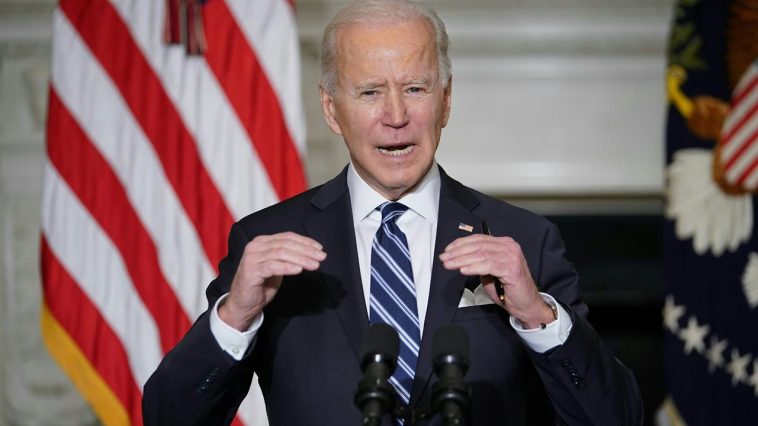A group of high-ranking Senate Republicans have expressed their fervent disapproval of President Biden’s approach towards the Venezuelan issue. At the forefront of this movement is Sen. Dan Sullivan from Alaska. They have called upon our president to stand firm against the tyranny of the Venezuelan regime and to refrain from providing any relief from oil sanctions. This stance comes in light of the Venezuelan government’s continued oppressive actions against dissension, a decidedly undemocratic and authoritarian approach.
The seven-member team led by Sen. Sullivan wrote to the president on Friday, employing strong words of contradiction to the proposed General License 44. Their intent is to prevent the renewal of the license due later this week. They are adamant that Venezuela has failed to uphold the preconditions tied to fair electoral practices, which were part of the initial deal when the six-month license was issued by the Biden administration the previous year.
These Senators took a strong stance against the miss-handling of authoritarian regimes. With historical evidence showing that the policy of appeasement does little good, they have passionately urged the president to reinstate all U.S. sanctions on Nicolás Maduro’s regime. They believe that the U.S should not renounce its leverage by relaxing these sanctions since Venezuelan authorities are neglecting their responsibilities.
The implications of the U.S dropping the ball on protecting democratic values in Venezuela has wider ramifications, the senators argue. If America fails to enforce the realization of free and fair elections in Venezuela, it serves to embolden other authoritarian leaders around the world, specifically referencing nations like China, Iran, and Russia, posing a global challenge.
In more recent developments, Nicolás Maduro, the controversial Venezuelan President, had signed an agreement with opposition leaders last October. As per the agreement, Maduro committed to a freer electoral environment in exchange for eased U.S. sanctions on Venezuela’s vital oil sector. This move, however, led to suspicion as the Maduro regime resorted to crackdowns and imprisonments of opposition representatives in violation of the agreement, thereby skewing the presidential election scheduled for July 2024.
The State Department conveyed in October that they are unlikely to renew the General License 44 if the Venezuelan government fails to make strides in its promises. A key term of the October agreement was that it facilitated oil and gas transactions with Venezuela. This provision came into effect a year after the Biden administration permitted Chevron, the California-based energy enterprise, to continue its drilling operations in Venezuela.
Interestingly, U.S. oil imports from Venezuela have observed a steep increase, leaping from nil in December 2022 to close to 5 million barrels in January. This surge comes after a period of steep decline in U.S. imports of Venezuelan oil following the stern sanctions imposed on the nation’s oil industry by the Trump administration in 2019. These sanctions were part of a larger diplomatic struggle between Maduro and the opposition leader Juan Guaido.
Sullivan’s remark on President Biden’s actions, or lack thereof, were not minced. He pointed out the clear-cut need for decisive action against dictatorial regimes and called out the president for allegedly prioritizing the appeasement of his radical left-wing supporters, endangering national security in the process. He suggested that the Biden administration’s focus is misdirected while urgent international and national crises require attention.
Sullivan also drew attention to the Department of the Interior’s impending regulations that could potentially block access to 13 million acres across the National Petroleum Reserve. This region in North Slope Borough, Alaska was explicitly reserved by Congress for the purpose of resource extraction. He voiced strong opposition to any plans to put half of this prolific oil basin under lock and key.
The irony is not lost on Sullivan as he compared this restrictive move in Alaska to the likely renewal of the suspension of oil sanctions on the Maduro-led Venezuelan regime. He expressed concerns towards what he perceives as an contradiction within the same week by the Biden administration.
Sullivan depicted Alaska as the state suffering the most due to the Biden administration’s alleged failed energy policy. He contended that if the aforementioned rule is finalized, it would amount to the 61st action by the Biden administration targeting Alaska. He stressed that these actions are not in line with existing laws and lack proper consultation with the affected Alaska Native communities.
Efforts to reach out to The White House on these matters proved futile before the press deadline. Others who share Sullivan’s perspective and co-signed the letter to President Biden include Republican Senators, namely, James Risch of Idaho, John Barrasso of Wyoming, Bill Hagerty of Tennessee, Pete Ricketts of Nebraska, and Florida representatives Marco Rubio and Rick Scott.
The letter appears as a firm proclamation of these senators’ disapproval of the current approach to Venezuela. They clearly demand a harder stand against Maduro’s regime and believe that the policy of appeasing dictators is counterproductive to the promotion of democracy and the protection of American interests. Their unified stance represents a significant segment of the Senate Republicans, eager to prioritize national security and the preservation of democratic values.


